 Last week we looked at the importance of being where we are in our dating journey. That means applying dating standards to potential dating partners, not marriage standards. Thinking about marriage when considering a casual date is like putting the cart before the horse. No wonder LDS dating is so difficult and confusing for so many! Applying marriage standards to dating isn’t the only way LDS singles trip over their own feet when dating. Too many test their dates during the date. This practice prevents living in the moment. And you can’t fully enjoy the moment if you don’t live there. I know what many of you are thinking. How can we know whether or not to go farther with our dating partner if we don’t test? I’m not saying don’t test. I’m saying there’s a time and place for everything, and the date is not the time or place for testing. We test best after the date, not during. Watch your broadcast  We all broadcast our inner self to those around us. If you test your date during the date, you have an agenda, and you’ll be broadcasting that. Most people will pick up your broadcast, usually to negative effect. That shouldn’t be surprising. Most people want to be loved for who they really are and not part of some agenda or project. When you test your date during the date, you broadcast you don’t really care about your date as a person but rather as a means to an end. One of two things typically happens. First, not wanting to be filler material, your date could withdraw from you. If your date could’ve made an excellent companion for you, then you just shot yourself in the foot. You just extended your singles life. Congratulations! And the other possible outcome? Your test makes your date far more nervous and anxious. He or she knows, in order to go any further with you, he or she must pass your test. But not knowing exactly what the right response is or even what the test itself is, your date will likely bumble his or her way through the date, leaving you with a false impression of who they are. And that could very well lead you to make the wrong call. Learn from others  I once knew a woman who was in many respects a perfect companion for me. So of course I was interested in knowing her better. After a few texts and emails, we went out a few times. Yet in all our interactions, I couldn’t escape the feeling she was testing me. That feeling was especially strong during our dates. I kept trying to put on a good performance without knowing what she wanted to see or hear. All the while, I never really enjoyed our time together because I never could. I was always worried I would say or do the wrong thing, and it would be one too many wrong things, leading her to say “Thanks, but no thanks.” In the end that’s exactly what happened. She simply walked away. The last I saw of her was at a singles activity. She came with some guy I’d never before seen. And after months of non-response, she suddenly started talking with me as though we were best friends. Even here she was still testing me. After hearing an clearly unwanted answer to a question about my employment (at the time I was between jobs), she walked away. I never saw or heard from her again. You must risk  Some might say this experience proves we weren’t meant to be together. My own experience tells me we would have been good companions for each other. I don’t know what happened to her, but I hope she got what she wanted. I can understand her perspective. Her divorce was particularly painful, and she wanted assurance she wouldn’t experience that pain again. That’s completely understandable. Yet love is such that you must risk in order to get reward. You can’t get the relationship you really want without making yourself vulnerable. I wish she could have let go during our dates and just enjoyed my company. Even if things still didn’t work out, we might have been friends. Don’t test your dates during the date. Just be yourself and enjoy what the other person has to offer. You can evaluate your date after the date. Then is the time when you can thoughtfully consider whether going further with this person is a good idea or not. When you’re interacting with others, be present in that moment. Doing so will allow to experience all the joy that moment has to offer. And that will bring more joy in your journey.
0 Comments
 Last week we discussed the need for LDS singles to expand their casual dating pools to include everyone — well, almost everyone; jerks, stalkers, and criminals need not apply. Many LDS singles resist expanding their casual dating pools because they inappropriately pre-judge potential dating partners by filtering for marriage material. Superficially, that seems to make sense. Dating leads to marriage, and we don’t want to end up with someone we don’t really want. Plus spending all that time and money with someone who won’t be with you in the end seems wasteful. Isn’t it better not to start if you won’t finish? This logic prevalent among LDS singles keeps many of them single longer than needful — in some cases, much, much longer. Here’s a more effective approach: Apply standards to where you are in your dating journey. Don't reject a date based on your standards for marriage. Reject a date based on your standards for dating. Know where you are Effectively applying standards to dating requires you to understand where you are on the map of your dating journey. With that in mind, let’s review what we’ve learned recently about the stages of the dating journey.
Know your next step You don’t need a map to know where you’re going. But a map becomes very useful to tell you how to get there. Understanding the different stages of the dating journey helps you know where are on the map. That begs the obvious question: How do I get where I want to go? You don’t climb a mountain by constantly staring at the peak. You climb a mountain by looking where your feet you are and taking a step forward. Your focus, then, should be on the next step in front of you, not the end goal. Once you know where you are in your dating journey, your next step will be to secure the agreement for the next stage. If you don’t have the necessary agreement, you don’t progress. Period. That’s why this is your next step. Be where you are That’s harder to do when you’re staring constantly at the summit and never on where your feet actually are. How long will it be before you trip and land on your face? Many LDS singles find dating disagreeable because that’s exactly what they experience. They keep tripping and landing on their face. If that’s your experience, here’s some free advice: Stop looking at the summit! Be where you are. If you focus on where your feet are and take the next step directly before you, and then the next one, and so on, eventually you’ll climb the mountain. So focus on where your feet are: Apply standards of dating to dates. This of course means you might date someone you wouldn’t marry. So what? That’s perfectly normal; everyone dates people they never marry. Only by dating lots of people will you better know that right type of person who demands more serious consideration. Because you’ll date people you’ll never marry, your standards will change with each stage of the dating journey. You’ll casually date people you won’t commitedly date. And you’ll committedly date people you won’t marry. Recognizing these truths makes it easier to be where you are. You can better enjoy someone’s company irrespective of whether or not you’ll marry that same person when you focus on that moment rather than on some agenda to achieve a future goal. Applying standards of dating to dating helps you to be in the place where you are. This in turn helps you to live more fully in the moment and makes you more attractive to someone who can help you be where you want to be. And that will bring more joy in your journey.
 Last week while discussing Elder Ballard’s most recent Conference address, I spoke about making goals to get married and our need to center our dating efforts on the Savior. Doing that means understanding the fundamentals of dating. One fundamental principle is recognizing the two types of dating. We often confuse ourselves by not making this distinction. We introduce even more confusion in our dating journey when we try to be where we aren’t. Placing too much seriousness too soon in our journey turns us into our own worst obstacle. Being in the place where we are means conforming our actions to where we currently find ourselves. Because there are two types of dating, we should act differently in each respective stage. Committed dating will have more seriousness than casual dating. In fact, when you correctly understand the fundamentals of dating and the two types of dating, you can’t avoid a simple but profound conclusion: Unless the other person is a jerk, a stalker, or a criminal, you should date everyone. You choose your probability of success  The provision against dating a jerk, a stalker, or a criminal makes sense to most. You shouldn’t compromise your personal safety. But the rest of the conclusion to date everyone else will put many LDS singles into a panic. If that’s you, please calm down. This just shows you understand neither the fundamentals of dating nor the nature of casual dating. A casual date is just that — casual. So why make the date serious by putting extensive restrictions on having one? The point of casual dating is to learn more about what you want in a companion so you can narrow down your selections to just one. You’ll then focus on securing the agreement you need to transition to committed dating. That means your probability of success increases as you increase the size of your casual dating pool. You do that when you lower the restrictions on who can enter. That means dating everyone (with the obvious exceptions, of course). Feeling is not knowledge  Many of us want to resist this way of thinking. Some may think I’m advising against having standards while dating. Still others may reject the conclusion because they just “know” So-and-so isn’t right for them. First, you should have standards while dating. Your success, however, will be more likely if you’ll be in the place where you are. Casual dating by its very name suggests a different set of standards than committed dating. You could very well casually date someone who you do not committedly date. In fact, most of us have. Second, I understand the feeling that comes when considering some people as a potential date. It’s like every cell in your body is screaming “NO!” But feeling is not knowledge. You’ll never know unless (1) an angel or other heavenly messenger gives you the knowledge or (2) you get your own experience. I’m thinking the odds for most of us seeing an angel aren’t that great. I love this comment from a married woman named Kathryn.
Such examples abound, showing we really don’t know like we think we do. We should stop pre-judging others and open ourselves to new possibilities. Let experience tell the tale. Like Kathryn, you just might be surprised at what you don’t know. Be in the place where you are  Our LDS subculture has primed us for years to look to temple marriage as a pivotal life moment. And it is. But you’ll never climb the mountain if you constantly stare at the peak without ever looking at the ground directly in front of you. The best way to complete your journey is to look at the ground where you are and occasionally glance at the peak to ensure you’re moving in the right direction. This is the role of feedback we discussed last week in Elder Ballard’s Conference address. Once you know you’re moving in the right direction, be where you are. Whatever stage you’re in, that’s the place where you should be. That means your actions show you’re in casual dating if you’re in that stage of your journey. When you’re ready to move to the next stage of your journey, secure the agreement you need to enter that next stage. Keep focusing on where you are and the very next step you need to take. Your steps will build upon themselves, and eventually you’ll find you’ve climbed the peak. I have yet to find my eternal companion, but I’ve found some wonderful experiences by opening myself to new possibilities when casually dating. I’ve also had more committed dating experiences because I opened myself more in casual dating. Open yourself to new possibilities. You just might be surprised. And you’ll have more joy in your journey.
That’s because the road to marriage is correlative, not causal. We’d all like it to be as simple as making waffles. But it just doesn’t work that way. Our success in finding the right spouse will more likely come as we make our lives something that someone special will want to share with us. By making ourselves more attractive and taking advantage of opportunities we find, we can make eternity our goal.
The problem is the plan I can run with Elder Ballard here because of how he defines goals and plans: “A goal is a destination or an end, while a plan is the route by which you get there.” There’s nothing wrong with the goal to get married. Our problem in making that goal is the plan. For LDS singles, making eternity the goal means making celestial marriage a goal. However, everyone will have a different path — and hence a different plan — to get there. Elder Ballard described that path further when he declared, Again, the problem isn’t the goal. We should make every essential covenant we can. The problem is the plan — how we get the right type of person to decide in our favor. We can better accomplish that when we craft the short-term plans we have for our lives within the long-term plans our Heavenly Father has for our eternity.
Return and receive  Elder Ballard believes the words return and receive “symbolize God’s goals for us and our most important goals for ourselves.” Focusing our attention on these words can provide us with a clarity guiding what we do. That clarity becomes ever more important in a world full of voices distracting us from our eternal goals. Some voices are intentionally evil. Other voices are simply blinded by the philosophies of men and women. However well-intentioned those other voices, listening to them results in the same deviations from our eternal goals. That’s why it’s important to have some type of feedback. Elder Ballard suggests a regular interview with yourself. I suggest some of us may also benefit from having at least one trusted friend who’ll be brutally honest with us. Sometimes family members can serve this role as well. Partnering with the Lord will help each of us to know what feedback will be best for us. Center on the Savior  I love how Elder Ballard tied in goals with "The Living Christ," a testimony of the Savior which the First Presidency and the Quorum of the Twelve published in 2000. I especially love how he put it into context with the more often referenced Family Proclamation. Elder Ballard said, “We speak often about the family proclamation, but please remember to read it in light of the saving power of the living Christ. Without the living Christ, our fondest expectations will be unfulfilled.” I love that because it speaks to our need to replace our family-centered culture with a Christ-centered one. Christ is the center of everything in the gospel. The Savior and His marvelous Atonement are what make our Heavenly Father’s goals and plans possible. Given we should make our goals and plans within the broader confines of our Heavenly Father’s goals and plans, we should center what we do on the Savior. How do we do that in the context of dating? Remember there are two types of dating. For casual dating, centering on the Savior means partnering with the Lord as you determine who among your options you should investigate more closely. For committed dating, it means inquiring well into your partner’s potential to help you realize your eternal potential. In all cases, it means participating in activities that don’t offend the Spirit or violate our covenants. It also means counseling with the Lord regarding timing. We should always plan what we’ll do to work towards our eternal goals. But we shouldn’t have a plan prescribing a specific date for achieving eternal blessings. Elder Ballard concluded his remarks with this testimony:
Our goals for dating should align with our Heavenly Father’s goals to save and exalt us. Time spent aligning our goals with our Heavenly Father’s is time well spent. Let’s each examine how well we’ve each made eternity our goal. Then let’s repent and make corrections where needed. Doing so will bring more joy in our journey.
 Lately I’ve been talking about the fundamentals of dating because so many don’t understand them. Today I’m addressing one fundamental in particular. But first we need to consider what we’re trying to accomplish. Because dating involves the agency of another person, success in that journey is correlative, not causal. That means we get better results by making ourselves more attractive rather than campaigning directly for it. I’ve tried the direct route before. After years of effort, I can say it just doesn’t work. So now I’m where every LDS single should be — on the correlative train. Instead of pursuing marriage directly, we should live our lives such that others will want to share them with us. We get that kind of life by making ourselves more attractive — physically, emotionally, mentally, and spiritually. Each of these aspects is intertwined with the other three. Take losing weight, for instance. Losing weight of course has physical aspects, but it also has emotional, mental, and spiritual aspects as well. Those who ignore those other three aspects are essentially taking a proverbial knife to a gun fight. Include the physical 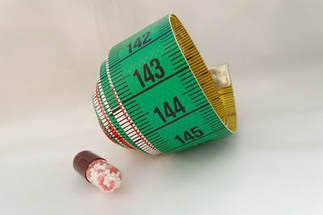 I believe the best solutions are holistic; they consider the whole as well as the individual parts. Losing weight is no different, though I confess it’s been really hard. Losing weight is the Holy Grail of modern life — forever beckoning, and forever elusive. But that just means I don’t understand the fundamentals! For years I tried increasing my understanding of biology. Much of my knowledge here is hard won through research in books and testing in the laboratory of trial and error. That’s how I know if I don’t keep myself fully hydrated, I won’t lose weight. I now drink mostly water whenever I drink anything, starting with a full glass of water when I get out of bed in the morning. Good nutrition is also important. I’ve seen better results with a daily regimen of vitamins and supplements. Yes, it’s better when they come from food, but I haven’t the time to track how much of each vitamin every food I consume contains. It’s much easier to pop a pill and be done with it. You need to find what works for you. Don’t neglect the emotional and mental  Because weight loss is interconnected in its aspects, we can’t focus on just biology. The emotional aspect is of especial concern for LDS singles. Acceptance in LDS subculture depends greatly on whether or not we get married. Thus, failure in our dating journey can easily leave us feeling unaccepted. That’s what makes eating extra food — and especially the foods we shouldn’t eat all the time — so very tempting. They never say no. They never turn us away. And they always make us feel good. At least they do in the moment. Emotional eating always comes back to bite you (pun intended). We’re not likely to lose weight without addressing the underlying emotional issues driving unhealthy eating habits. And let’s not forget the mental aspect of losing weight. If we believe we’re “big-boned” or genetically disposed to carry fat, we’re setting ourselves up for failure. We’ll never put forth the effort as intensely and for as long as we need if we believe any of that. We have to believe before we receive. Emphasize the spiritual  Of all the aspects to consider, the spiritual is the most important. We need to articulate clearly and precisely why we want to lose weight. And that why needs to be powerful enough to carry us through the hard times. The most powerful spiritual drivers are faith-based. We activate that faith when we understand the doctrines and principles behind our objectives. So what’s the gospel doctrine behind losing weight? Certainly the Word of Wisdom comes to mind. And how about the doctrine that our body is a temple? If you considered just that one idea every time you put something in your mouth, what changes would you make to your eating habits? What’s the biggest reason why I’ve struggled with losing weight for so many years? I’ve been approaching it backwards. Even with the holistic nature of my approach, I wasn’t starting with the spiritual aspect. I started with the application — give me the fix I need to make my fat melt away — rather than with the doctrines and principles behind the application. Recently, I’ve picked the torch back up. I’m trying again. So can you. But this time, let’s start our holistic approach with the spiritual. That will bring us better results. And that will bring us more joy in our journey.
|
Author
Howdy! I'm Lance, host of Joy in the Journey Radio. I've been blogging about LDS singles life since 2012, and since 2018 I've been producing a weekly Internet radio show and podcast to help LDS singles have more joy in their journey and bring all Latter-day Saints together. Let's engage a conversation that will increase the faith of LDS singles and bring singles and marrieds together in a true unity of the faith.
Comment
Joy in the Journey Radio encourages the free discussion of ideas but reserves the right to remove and/or block comments which do not conform to LDS standards.
Donate
Joy in the Journey Radio offers many free resources to help LDS singles everywhere, but it certainly isn't free! Help Joy in the Journey Radio in its mission to improve the lives of LDS singles by donating today.
Posts by Month
December 2022
Categories
All
|
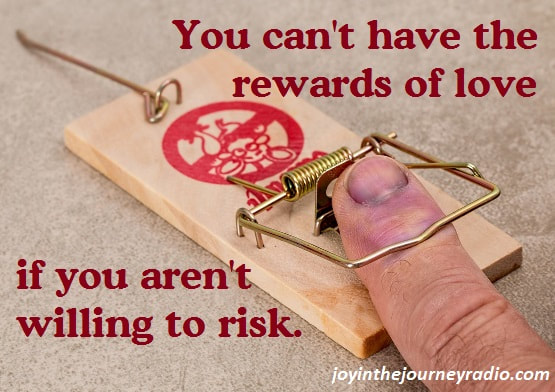
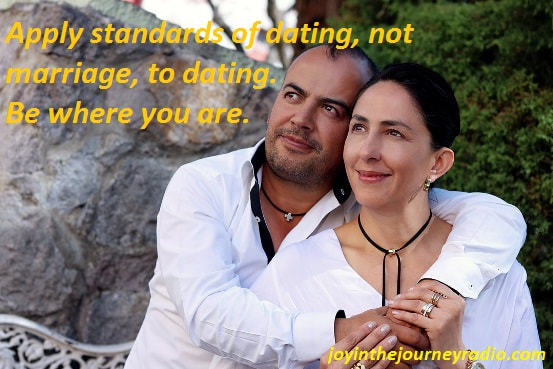
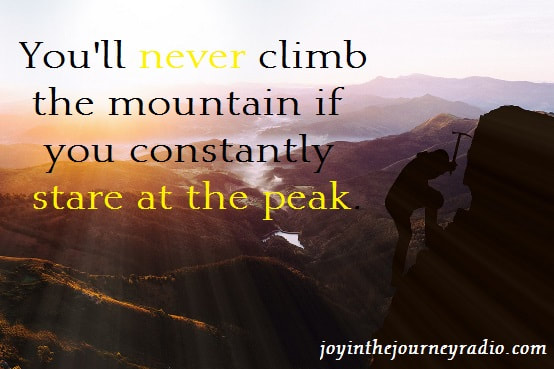

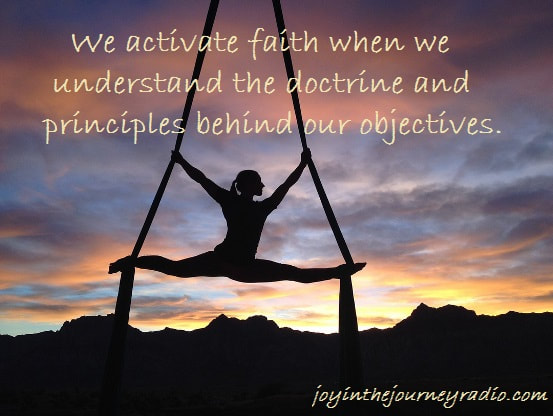
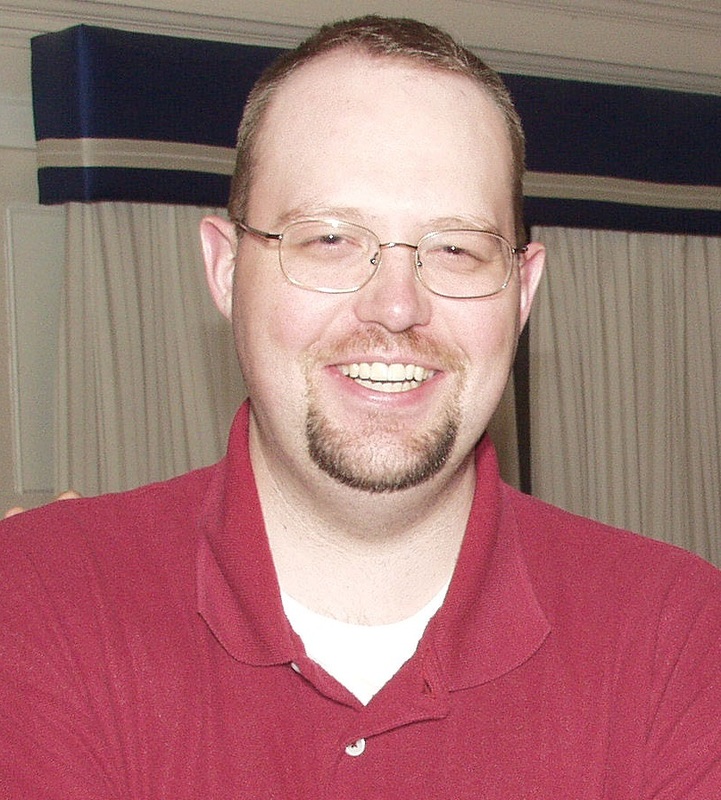
 RSS Feed
RSS Feed